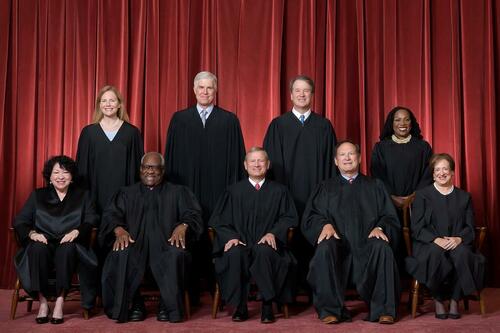Chief Justice Roberts Urged To Probe Lower Court Judges’ Political Outbursts
Senate Judiciary Committee Chairman Chuck Grassley (R-IA) and House Judiciary Chairman Jim Jordan (R-OH) have sent a letter to Chief Justice John Roberts, calling for investigation of partisan statements by activist judges.
Dozens of lower court judges are accused of making anonymous statements to the New York Times for an article it published titled “Federal Judges, Warning of ‘Judicial Crisis,’ Fault Supreme Court’s Emergency Orders.”
The lawmakers point to remarks by lower court federal judges who called Supreme Court emergency orders “mystical” and “overly blunt” while describing tensions in the judiciary as a “war zone” and telling the press that they were in a “judicial crisis.”
🚨NEW: Chairman @ChuckGrassley & House @JudiciaryGOP Chair @Jim_Jordan are calling on Chief Justice Roberts to address activist judges’ political outbursts to the press.
These partisan tantrums undermine the legitimacy of the Courts & may violate ethics rules. They must end now. pic.twitter.com/99U1mIPuTY
— Senate Judiciary Republicans (@SenJudiciaryGOP) November 5, 2025
The Judiciary Committee chairmen express concern that inflammatory comments from lower court judges cast doubt on the judiciary’s integrity and impartiality and could be a violation of the judges’ ethical obligations.
The lawmakers wrote: “We are deeply concerned that these public attacks on the Court from sitting federal judges damage the public’s faith and confidence in our judicial system. When judges call into question the legitimacy of their own branch of government, they erode faith in the institution itself.”
According to the ethical canons contained in the Code of Conduct for United States Judges, federal judges are bound to “uphold the integrity and independence of the judiciary” in Canon 1 of the Code of Conduct.
Canon 2(A) states that “[a] judge . . . should act at all times in a manner that promotes public confidence in the integrity and impartiality of the judiciary.”
Canon 3(A)(6) states: “[a] judge should not make public comment on the merits of a matter pending or impending in any court.”
Grassley and Jordan also asked Roberts whether, as presiding officer of the Judicial Conference of the U.S., he agrees that these anonymous comments are undermining public confidence in the courts and whether the judges making those statements have been cautioned about their behavior.
The letter from the Judiciary Committee chairmen also ask Roberts if guidance has been provided to these anonymous judges and whether he plans to provide such guidance as well as whether the judicial branch intends to investigate this type of conduct.
Grassley and Jordan wrote to Roberts: “We urge you to consider the appropriateness of these public yet anonymous comments and whether they breach the ethical obligations of all federal judges. While we do not yet know the full extent of the comments or who the judges are, we remain convinced that judges should not be going to the press to undermine and denigrate the Supreme Court.”
Tyler Durden
Thu, 11/06/2025 – 11:40ZeroHedge NewsRead More





 R1
R1
 T1
T1


